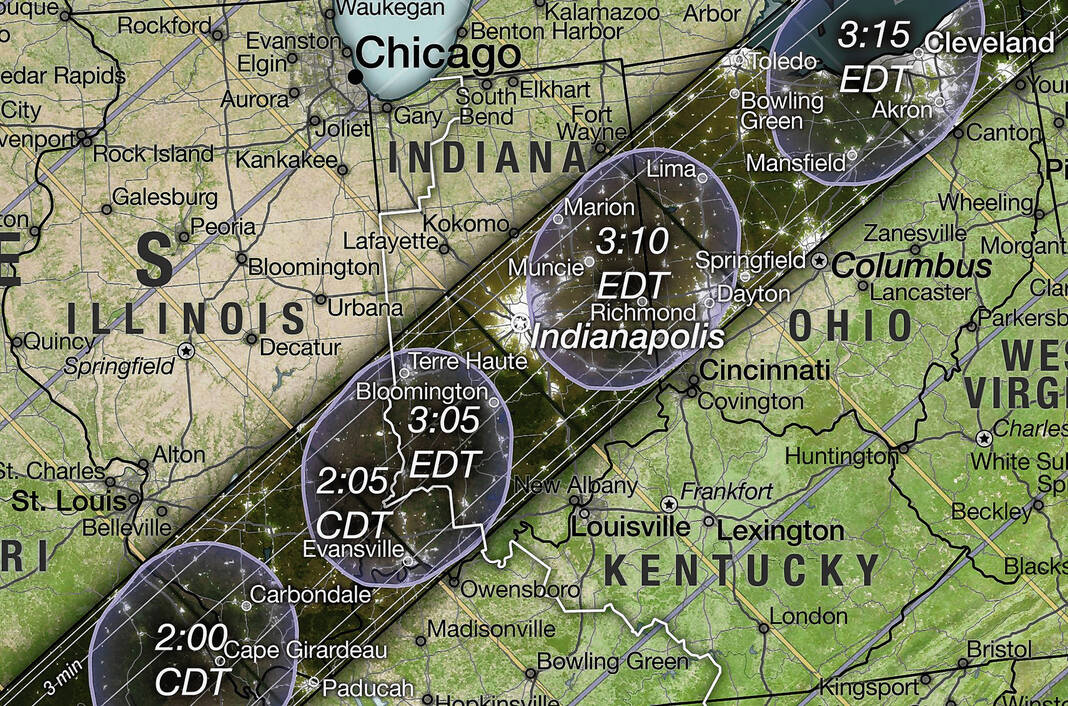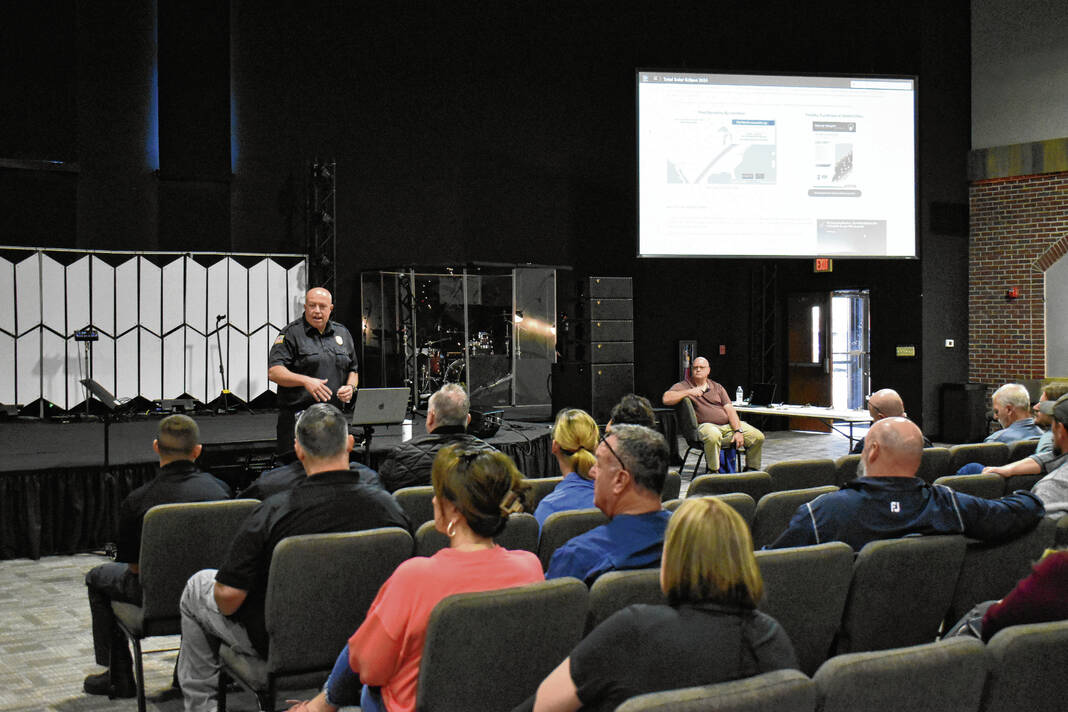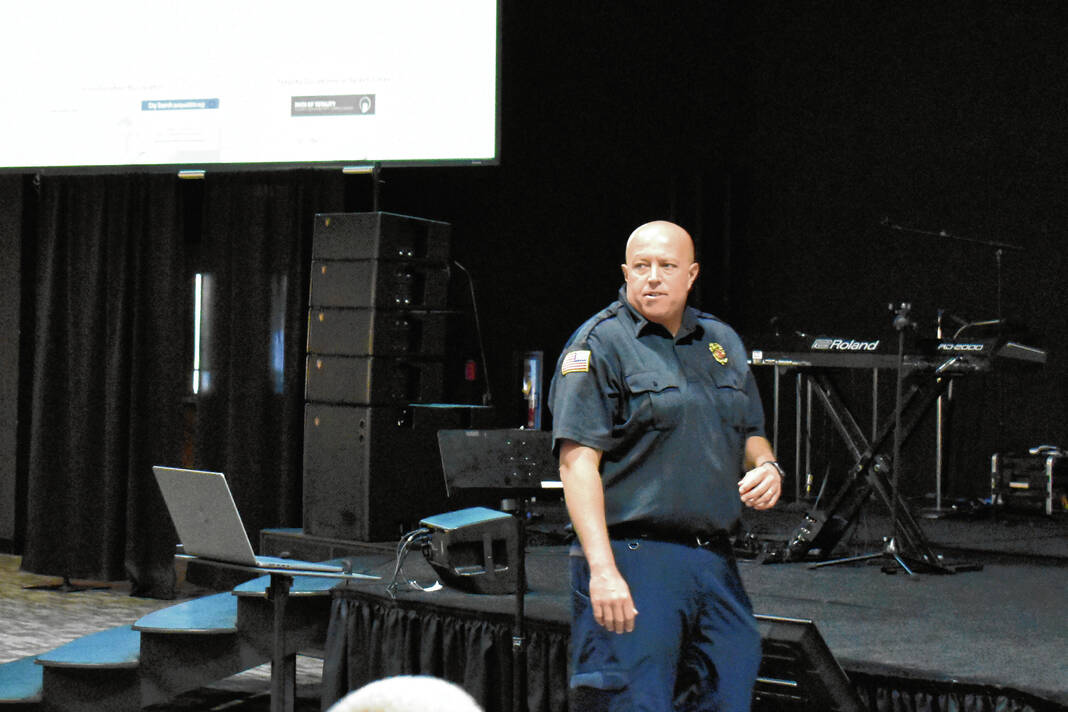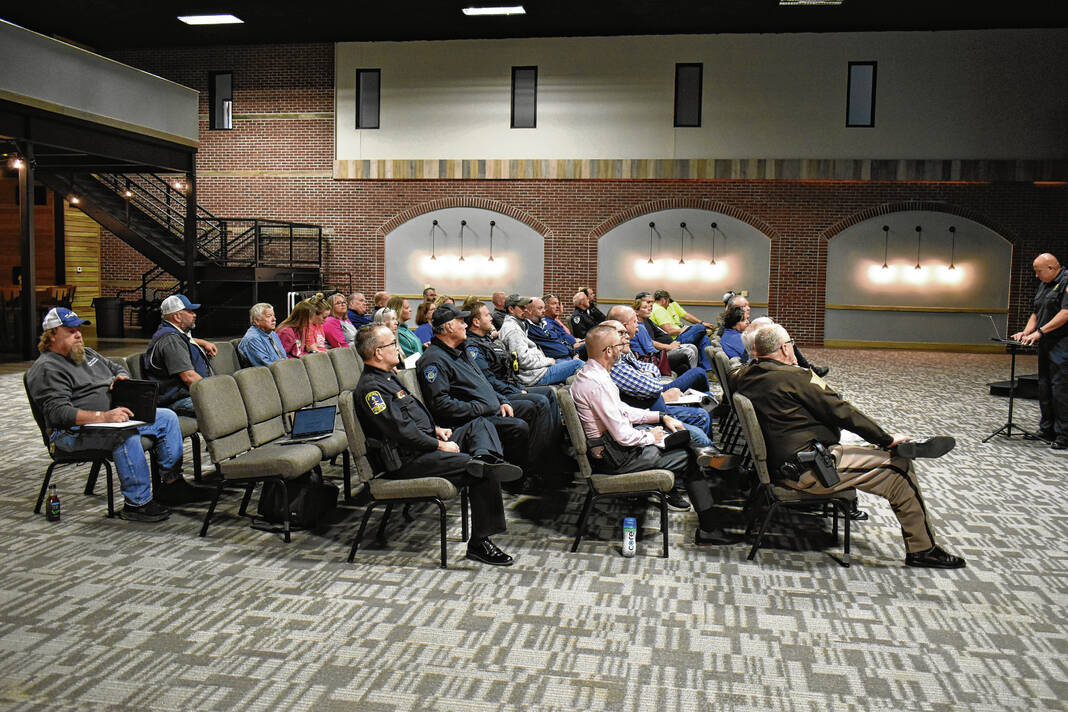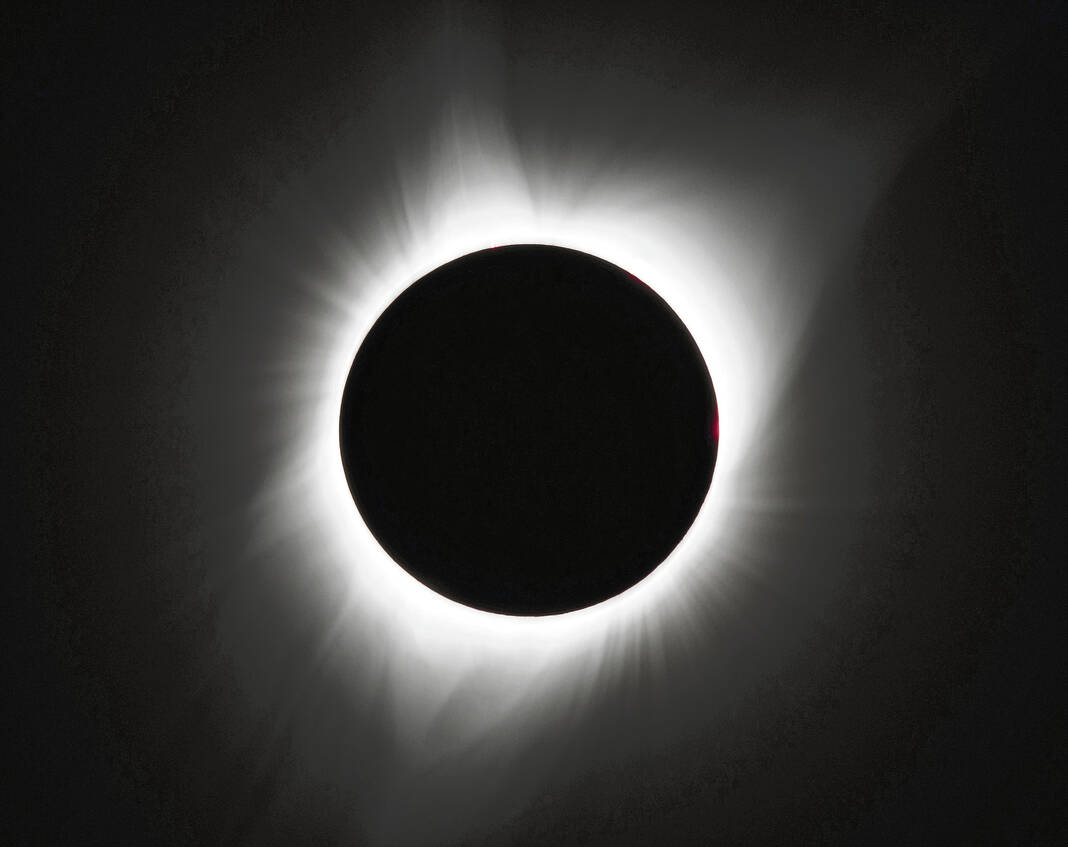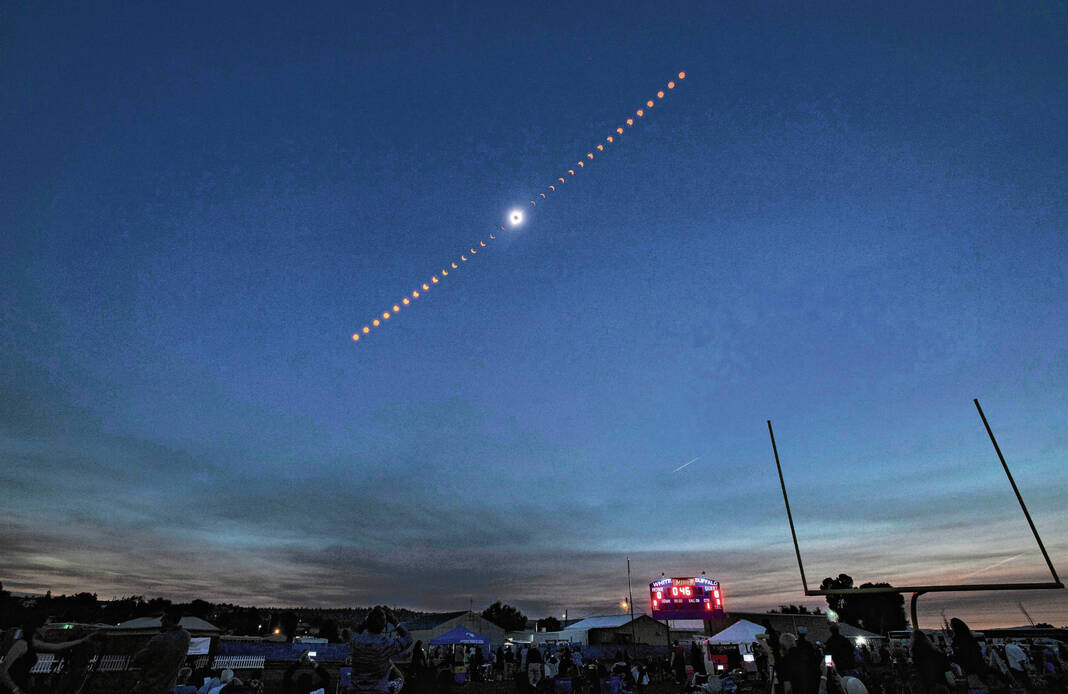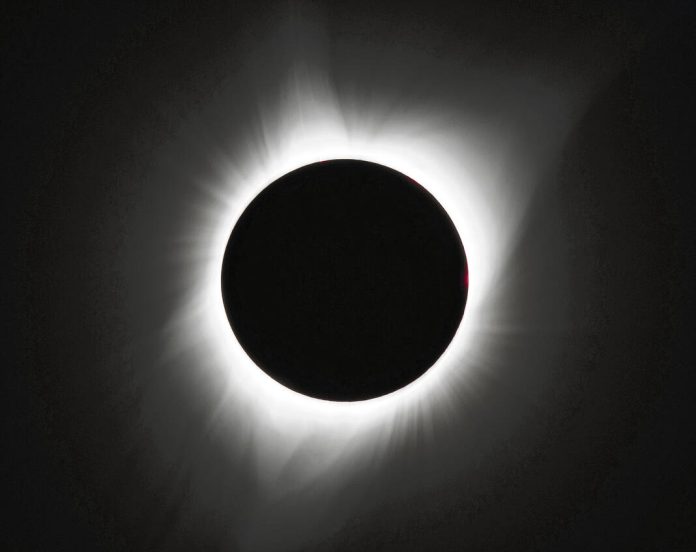
A total solar eclipse is seen on Monday, August 21, 2017, above Madras, Oregon. NASA/Aubrey Gemignani
For a few days this coming April, thousands of people will descend on Johnson County to experience a once-in-a-lifetime event — a total solar eclipse.
While the eclipse is a little less than six months away, local officials are making plans now and encouraging residents to prepare now for both the event and the influx of people. They are also embarking on making what is likely one of the largest emergency preparedness plans in Johnson County history.
“We want to be over-prepared,” said Eric Funkhouser, chief of both the Bargersville and Whiteland fire departments.
Officials and representatives of communities across Johnson County, along with the county government, gathered at Grace Assembly of God Church in New Whiteland on Thursday — nearly six months to the day of the eclipse — to discuss the eclipse, public safety and emergency management preparations.
A total solar eclipse
A solar eclipse happens when the moon passes between the sun and Earth, casting a shadow on Earth that either fully or partially blocks the sun’s light in some areas. This only happens occasionally as the moon does not orbit in the exact same plane as the sun and Earth do, according to NASA.
People located in the center of the moon’s shadow when it hits Earth will experience a total solar eclipse, which is where the sky will darken as if it were dawn or dusk. Depending on the weather, people in the path of a total solar eclipse can see the sun’s corona, or outer atmosphere, which is usually obscured by the bright face of the sun.
This type of solar eclipse is the only one where people can momentarily remove their eclipse glasses for a brief time when the moon is completely blocking the sun. Temperatures could drop as much as 10 degrees during totality, according to the Indiana Department of Homeland Security.
The total solar eclipse that will envelop Indiana will take place on April 8, 2024, with a partial eclipse from 1:50 to 4:23 p.m. The total eclipse will be from approximately 3:05:52 to 3:09:54 p.m. in the Franklin area.
Much of Indiana is along the path of totality, including Johnson County. In fact, Franklin is among the top viewing spots for the eclipse as it has one of the longest periods of totality in the state at 4 minutes and 2 seconds.
Total solar eclipses are rare. The last one that was visible in the U.S. was in 2017. After 2024’s eclipse, the next total solar eclipse visible to North America will be in 2044.
State officials expect nearly half a million people to descend on the areas of the state among the path of totality next April.
Variety of expectations
The goal of Thursday’s meeting was to make sure everyone was on the same page and to establish an operations plan. The meeting was organized by the Johnson County Joint Incident Management Team, which is made up of local emergency management and public safety officials.
“We know there’s going to be a large amount of people that will come in due to the fact that we’re in the path of totality. … What our goal is over the next few months is just to build a plan for public safety and work with all the municipalities around just to make sure that we’re prepared and ready to go,” Funkhouser said.
Some local law enforcement agencies are planning or have already canceled vacations because of the eclipse. The Johnson County Sheriff’s Office is planning to have every deputy working the day of the eclipse, said Sheriff Duane Burgess, a member of the incident management team.
Officials also discussed the realities of how the eclipse would strain resources. On the day of the eclipse, heavy traffic may cause gridlock and block roads.
As an example, Funkhouser referenced a story about how a two-hour drive on Interstate 65 in Kentucky became a 10-hour drive following an eclipse.
“They were seeing just a large number of people that all hit the roads at the same time, so people got stuck,” he said.
Based on conversations had with other communities that have experienced similar eclipse events, officials expect drivers to stop in roads, pull off on shoulders, park in yards, double-park and otherwise block traffic once the eclipse begins.
The sheriff’s office is also reaching out to have fuel resources for drivers who may get stuck in traffic after the eclipse.
Fire departments will have extra runs. Police will stretched, so cities and towns may need to pay to have private security for events. Drug use may also increase, based on what’s occurred in other communities, Funkhouser said.
Johnson County Public Safety Communications is planning to have full staffing on the day of the eclipse and to have redundancies in place to make sure emergency communications remain operational. Ham radio operators will also be utilized, officials said.
Local emergency management officials have also asked schools to plan to have e-Learning days on April 8, and so far five of the six public school districts have done so. Officials plan to strongly encourage the last district to do so later this month.
Health officials are also discussing the possibility of setting up family assistance centers in areas of the county. These locations would be triage areas and give people a place to go if they are displaced because of out-of-towners booking up all local hotels.
Numerous events planned
Local communities are planning numerous events for the eclipse, including the weekend leading up to it.
Franklin, for example, is having events starting on April 6, the Saturday before the eclipse, April 7 and April 8. Events include live music, a 5K Run/Walk, hot air balloon rides, food trucks, a beer and wine garden and an Astronomical Space Club Program.
Events on April 8 are expected to go on until 6 p.m., which is after the eclipse has concluded. This timing is to keep people off the roads a little longer so everyone won’t leave at the same time and snarl up traffic, Franklin officials said during the meeting.
In the Greenwood area, events are planned on April 7 and 8 so far. Activities include live music and entertainment at BOLDAviation at IndySouthGreenwood Airport and Craig Park.
Johnson County Park is offering camping from April 6 to 8. Other events at the park include an adult egg hunt, a DJ, yard games, food vendors, concerts and possibly beer and wine, according to Festival Country Indiana.
Edinburgh is holding an art-themed eclipse event on April 8. Total Eclipse of the Art will feature eclipse viewing, chalk art, music, handcrafted items and a community mural event.
Kelsay Farms in Whiteland is also opening their farm for eclipse viewing, according to Festival Country.
Several area churches are offering parking and a spot to view the eclipse, like St. Rose of Lima Catholic Church and First Mt. Pleasant Baptist Church; or offering overnight camping for campers and RVs, like New Hope Church.
Local hotels have already sold out of rooms for the eclipse, with some rooms going for as much as $1,000 a night in Franklin, officials said.
Residents need to prepare
Local officials stress that residents should prepare ahead of time.
As visitors arrive in the area, grocery stores and convenience stores will likely run out of supplies. The same could happen for fuel at gas stations.
“People are going to start coming in on Saturday and Sunday, so they’re going to hit the grocery stores, they’re going to be fueling up and doing all the different things,” Funkhouser said.
Because of this residents should do their shopping and fuel up in the week before the eclipse. It’s no different than preparing for a winter storm, he said.
Once April 8 arrives, residents should stay home to avoid getting caught up in the congestion before, during and after the eclipse. Funkhouser, Burgess and Johnson County Emergency Management Director Stephanie Sichting all recommended this action, which is based on reports and conversations with other communities who have had an eclipse.
“What they told their citizens (was) if you don’t have to be out that day and you’re able to watch it at home, stay there. If you’re able to walk to the parks; if you live in a town or a city, walk to those areas,” Burgess said. “Traffic is going to be, from what I understand and what I’ve heard from other agencies, it’s gonna be gridlock.”
Officials are trying to work through this because they will still need to respond to emergencies. Residents will need to be patient because the amount of people will be unlike anything the county typically sees, he said.
Residents should also be prepared for people to park anywhere. This is despite officials telling them not to do that, said Stephanie Sichting, emergency management director.
“We’re not telling them to do that. People just do it,” Sichting said. “That’s happened in other states. … We have no control over that.”
Residents should make sure to not look directly at the sun without special eclipse glasses before the eclipse. There will be a period of total darkness where glasses can be taken off, but taking them off before that can damage eyes, Funkhouser said.
People should also make sure the glasses are purchased from a reputable source and are certified to be used during an eclipse, he said.
Local businesses should also prepare for the influx of people into the county. Officials are stressing that gas stations have extra fuel supplies as they could run out due to out-of-towners filling up.
They are also stressing that local restaurants be fully staffed and have enough food on hand.
“They’re having trouble staffing anyway, but they need to have enough food on hand, water,” Sichting said. “… It could be a four-day event where you’ll get wiped out on the first day and then essentially, if you’re out of fuel and you’re out of stuff, you’re paying somebody just to stay there. You’re not making any money. So that’s why we want them to be aware.”
Sichting encourages residents to follow the Johnson County Joint Incident Management Team on Facebook and X, formerly known as Twitter, to stay up to date and to spread the word about what to expect for the eclipse.
Local businesses and organizations who have questions or need information can reach out to the Johnson County Emergency Management Agency by calling 317-346-4655 or by emailing Sichting at [email protected].
AT A GLANCE
2024 Total Solar Eclipse
What: A solar eclipse happens when the moon passes between the sun and Earth, casting a shadow on Earth that either fully or partially blocks the sun’s light in some areas. People located in the center of the moon’s shadow when it hits Earth will experience a total solar eclipse, which is where the sky will darken as if it were dawn or dusk, according to NASA.
When: April 8, 2024. The eclipse will be from 1:50 to 4:23 p.m., with totality expected from approximately 3:05:52 to 3:09:54 p.m.
Where: All of Johnson County. Franklin is expected to have one of the longest periods of totality in the state at 4 minutes and 2 seconds.
ECLIPSE PLANNING RESOURCES
Here’s a look at some resources for the 2024 eclipse:
Johnson County Joint Incident Management Team — Facebook: facebook.com/JCOINIMT; X, formerly known as Twitter: x.com/JOCOINIMT
Indiana Department of Homeland Security — in.gov/dhs/solar-eclipse-2024/
Festival County Indiana (local events): festivalcountryindiana.com/eclipse
NASA — science.nasa.gov/eclipses/future-eclipses/eclipse-2024/


